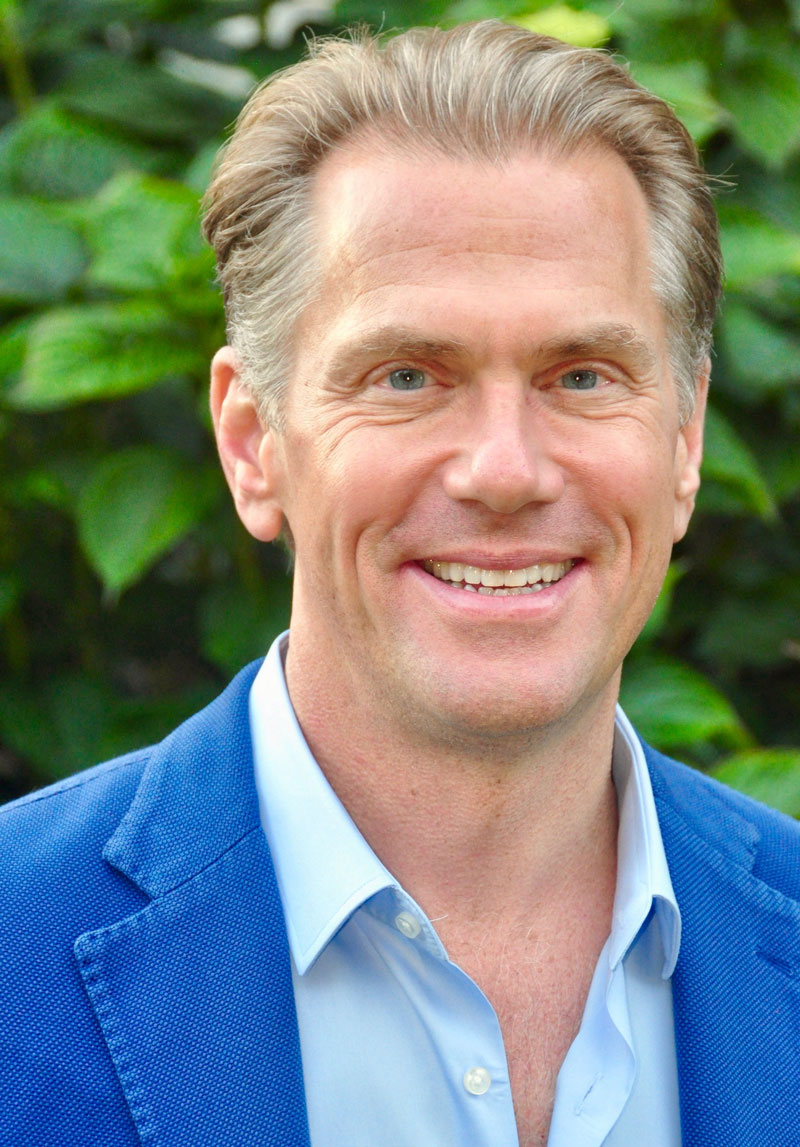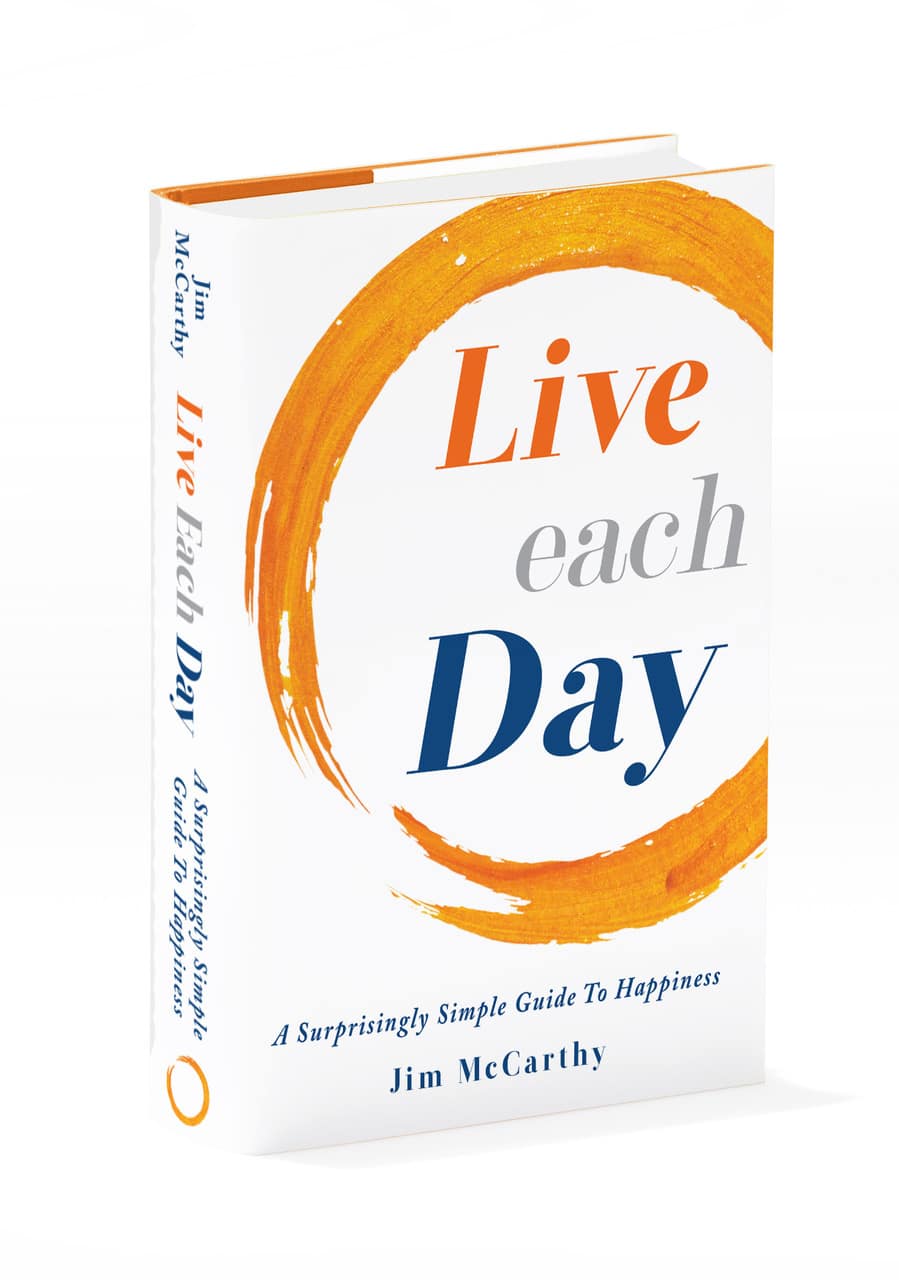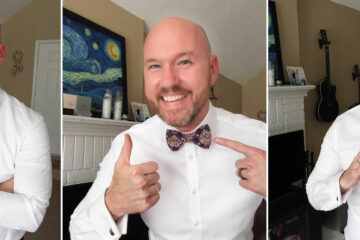The Truth About Happiness & Simple Math to Make it Happen

I know I’ve touched on the role and importance of happiness before, but this time I’m kicking it up a notch with science to explore the truth about happiness. Not to be confused with its apathetic cousin, contentment, happiness is about finding joy in the everyday, and letting it permeate into the tasks, trials, and takeaways of your everyday life.
On this episode, I’m joined by Jim McCarthy. He’s a TEDx speaker and # 1 bestselling author of Live Each Day: A Surprisingly Simple Guide to Happiness. He teaches people how to create their happiness by blending mindfulness techniques and timeless wisdom with simple, science-based practices. Jim is recognized for his unique perspective as a Stanford MBA, internet pioneer, and person living with a cancer diagnosis.
He has presented his innovative and acclaimed “Happiness Keynote” to organizations of all sizes across the U.S. and internationally. Audiences take away practical strategies, evidence-based insights, and daily action plans — because happiness is a skill you can develop.
This episode covers the truth about happiness and simple math you can’t ignore. Once we open your mind to the 1%, you’ll never be the same. No excuses. It’s a big deal. Take a listen and let me know what you think in the comments below. [Subscribe Here]
SHOW NOTES:
 Before we go any further, I want to address two things: 1 – the audio in the beginning isn’t great. It’s only for the first 2 minutes or so. 2 – I want to make sure you know you can get Jim’s amazing book on amazon right now, and if you go to his website, you can download the first chapter of the book completely free. Jim’s Book | Jim’s Website
Before we go any further, I want to address two things: 1 – the audio in the beginning isn’t great. It’s only for the first 2 minutes or so. 2 – I want to make sure you know you can get Jim’s amazing book on amazon right now, and if you go to his website, you can download the first chapter of the book completely free. Jim’s Book | Jim’s Website
** This interview is not being completely transcribed verbatim because that’s just entirely too much text. I’ll paraphrase our questions and answers so you get good content, but for the whole thing, just go ahead and listen to the episode.
Blake Hammerton: Jim, thank you so much for joining me today! What I really enjoy about this book is that there’s science behind it. There’s so much more than just the pollyanna concept of “oh I’ll just try and be happy with everything.” You took the time to create exercises and insights to help us all recognize more joy and gratitude in our lives and what we can do to create more of it.
Jim McCarthy: Thank you so much for having me! I’m honored to be on the show!
BH: Tell us a little more about you and your story. I know we can get it from the book, but for those that haven’t read it yet, what do they need to know about you?
JC: I’m originally from Omaha –grew up in the Midwest– spent some time in Europe studying and working, but ultimately found myself in the Bay Area in California as a struggling door-to-door phone sales guy. Before that, I was an English teacher in Frankfurt (Germany), then a business journalist in Spain, and then was fortunate enough to get into Stanford Business School and graduated there in 1996. It was an exciting time because it was right at the start of all things internet in Silicon Valley.
I went to Yahoo and joined them as employee #258 globally, and it was an incredibly exciting to be part of the dotcom boom. I spent most of the last 20 years in tech, and then about 6 years ago, I was diagnosed with cancer. This was a huge wakeup call. I had to look at my life differently all of a sudden. My purpose, my legacy, my regrets, the work I do, what makes me happy – as a result, I started doing talks and venturing down the happiness exploration path. It allowed me to start workshops, and deliver my happiness keynote to a lot of amazing groups and organizations.
BH: Great intro! Man, 1996 had to be an exciting time to be in tech. So many opportunities!
JM: Yes, but when my class graduated in 1996, we honestly thought we had missed the boat. We thought the classes that graduated in 1994 and 1995, they were the ones that got in on the ground floor. It’s amazing because it just shows that no matter what your idea or adventure is, it’s never too late to do something innovative or game changing.
BH: I love that. It plays into the doubts I have. I may have a good idea, but then I doubt that it’s powerful enough to have an impact, so I skip it. I need to remind myself to chase it because it’s never too late. That’s part of the truth about happiness – it’s never too late.
There’s so much meat in this book, especially in the second part when you introduce us to the concept of Pleasure vs. Purpose. Pleasure being the enjoyment through things that just provide joy – recognizable to anyone. (vacations on a yacht, eating great food, tango dancing, etc.) Purpose being the enjoyment one gets out of doing something he or she loves or feels called to do. Can you explain a little more about that?
JM: I started talking to people about my cancer diagnosis and the questions I started receiving were about what I was going to do, who I was going to be, what did I need to change, etc. I placed these big questions at the beginning of the book to get people to think, and what I discovered through the workshops is that people had trouble defining what happiness actually meant.
What most people think for happiness is the pleasure side – relaxing on a beach, going on adventures, laughing with friends, making love to someone. What many of us –dare I say all of us– feel is the happiness in purpose. That is to say, even in situations that don’t look pleasurable, there’s joy. This can come from being active in a political campaign, doing work you love, accomplishing something difficult, etc. Motherhood and parenting is often a great example. Some days are not pleasurable at all, but the purpose is so powerful that great joy is often felt regardless.
Sometimes these two factions can tug at each other, but real magic happens when you learn to balance them and fulfill both of these places in your life.
BH: That’s again, what’s so great about your book is the science you provide behind the concepts and truths. You provide quotes, sources, and science, and it adds so much credibility to the entire piece of work. One of the things I want to touch on is Forgiveness. I’ve had other episodes and articles about radical forgiveness, and you mention it in your book as well. What role do you see forgiveness playing in our modern times of snap judgements and online personalities?

JM: Yes, forgiveness is one of the hardest things we, as human beings, can strive to do. We can get hung up on injustices and wrongs against us forever, and there’s no reason for it. It’s not good for your health, but more importantly, it’s not good for your wellbeing and perspective looking ahead. Forgiveness can set you free.
When you forgive, you’re not condoning what happened. You don’t have to speak with that person again, or continue having a relationship at all. It just means that somehow in your mind you have to look at the situation and say, “right now, no matter what happened to get me to this point, right now, I’m okay. I do not need to hold onto what happened in the past.” Now, there’s more to it, but that’s a high level look at what it means to detach.
Dr. Fred Luskin wrote an incredible book on forgiveness called Forgive For Good, and he’s also a friend of mine through Stanford. He’s a foremost authority on forgiveness and I have learned a lot from him. One of the other things he posits about forgiveness is the reframing. When we forgive, we get to reframe it so we’re not victims. We get to see the data of what happened, recognize the weight of it, realize terrible things happen to others as well and that we don’t have to be victims, and then we have the opportunity to change how we view it. It’s very powerful stuff.
BH: What else do you think helps us contribute to our happiness and our forgiveness?
JM: It’s a growth mindset, definitely. Having a growth mindset allows you to view past events, no matter how terrible they were, as lessons you can apply to make yourself or your future better. A fixed mindset looks at those past events and makes you feel that those events are your identity and you have to stay that person and be that victim. Nothing can change or improve. A growth mindset looks at it differently. You can think of it as the manure on the garden of life. It’s not great, but it certainly helps things grow and flourish.
BH: Exactly. I love that. Okay, so let’s look at it like an exercise. If I’m a regular Joe trying to create or recognize more happiness in my life, what do you think are 5 things I can start doing (or stop doing) right now?
JM: Excellent question. Here’s how I would answer that in no particular order.
1 – Stop Playing the Comparison Game
In Buddhism, there’s a concept called the Comparing Mind. Basically, if you compare yourself to others it is a recipe for disaster – a recipe for unhappiness. There’s a ton of research out there that shows people who use social media the most, tend to be the unhappiness because they’re constantly comparing themselves to other people. They’re comparing their regular life with the highlight reel of those they follow on social media. It’s not good.
Even I feel frustrated when I compare myself to others. The way to play the game correctly is the compare yourself to who you were before today. How have you grown? Are you better today than you were last week? Last year? 10 years ago? How have you gotten better? This is much more successful and positive way to track your forward progress, and gives you that personal inventory of what I’m doing right and who I’m being in my life.
2 – Be Present & Count Your Blessings
You cannot live in the past or the future because you’ll miss what’s happening right now. Stay focused on what’s actually in front of you so you can stay grateful for what you have in your life. We often get hung up on how great things were when we were 15, or 30; or how great they’ll be once we’re 40 or 50 or rich or traveling… we miss the perfect opportunity to experience gratitude and connection to things that bring us joy in the present.
Practice gratitude for what you have in the present moment, and you’ll find you’ve got a lot more the be happy about that you think. Sometimes, just stopping the thought of the past or the future so you can focus on the now can be life changing. We’re always going to have problems in our lives, regardless of our age or social status. We had an 83 year old in our Happiness workshop who was wildly successful and wealthy. When we asked him if he still had problems, he answered, “hell yea, I do.” It doesn’t magically get better or different when you reach an age or status level – it gets better when you’re grateful and stay in the present moment.
3 – It’s All About Your Relationships
Dan Gilbert, a Harvard Psychologist, has a great little quote: “We’re happy when we have family and we’re happy when we have friends. All the stuff we do in our lives is simply to get more of those two things.” And it’s true. We go to the right school to get the good grades to get the good job to get the right car to go to the right clubs and get into the right circle – just to have more connection to people.
Regardless of what we’re doing or not doing, we’re ultimately looking for connection. If you’re not feeling your happiest or need more joy, go spend time with family, friends, or a group that fulfills you. You’ll find that loneliness, even with all the stuff in the world, is the opposite of happiness. And connectedness, even with very little in the way of material wealth, can bring about the most amount of joy.
You can have whatever you want to make yourself feel happy, but ultimately, it will serve you better to understand what that material thing will allow you access to – namely, the people you want to connect with.
4 – Your Reactions Matter – The Rest is Data
I tell a story in the book (it’s a thousand year old parable) about the Chinese farmer who’s horse runs away one day and his neighbors say, “oh what terrible misfortune,” and he responds with, “perhaps… we’ll see.” A few days later, his horse returns with another wild horse so now he has two, and the neighbors say, “oh what great fortune,” to which he responds, “perhaps… we’ll see.”
Then his son is trying to break in that new wild horse and is thrown off, breaking his leg in the process and the neighbors say, “oh what terrible misfortune,” and he again responds with, “perhaps… we’ll see.” A few days later the Army comes marching into town to draft young men to go off and fight in the war, but the farmer’s son cannot go because his leg is broken. And again, the neighbors say, “oh what great fortune!”
Equanimity is about being clear on the data around you and not letting things have more emotional attachment than they should. Similar to Stoicism, it’s about keeping an observer’s eye on how you attach to situations and data in your situations. We are so quick to judge and decide what is good and what is bad, that we can often ruin our chances at experiencing something good because we’ve already decided its worth. We can’t know what is good or bad, as far as experiences go, because we’re not fortune tellers. We need to stay present and see everything as data, and choose to react.
5 – Affirmations Are Powerful
There’s a lot of opposing ideas out there today, saying that affirmations are pollyanna and don’t work. I believe affirmations can feel silly or maybe useless when you first begin saying them, but they’re the perspective you’re choosing to take on the world. How can that not be impactful? What’s wrong with setting up your day with a morning meditation or mantra (while making coffee, brushing your teeth, taking a shower – whatever) that reminds you of all the good things in your life and the good day you’re going to have?
Affirmations are your positive thoughts that fuel your actions and options. If you’re constantly thinking negative thoughts, you’re literally reinforcing that perspective and the habits and behaviors that go along with it on the neuro-chemical level. You are training your brain to see the negative always. You are setting up neural pathways that help to solidify your core perspective. If you want a better life with more joy and happiness, you need to stop saying negative things to yourself and others. Start with affirmations and keep at them. You’ll find they impact your day and your brain just as powerfully.
The 1% Principle
BH: Quite possibly my favorite part of the book was your introduction of the Magic 1%. Let’s explore that.
JM: Yes, the magic 1% is all about time. People often talk about not having enough time to dedicate to happiness or meditation or affirmations. They don’t believe they have time to self-improve, and it’s simply not rue once we laid out the math. When people tell me they don’t have time, I ask them how much of their day is only 10 minutes. How much is 10 – not 40 minutes, not two hours, not an entire afternoon… just 10 minutes.
When I did the math, it turns out 10 minutes is almost exactly 1% of your waking hours. If you sleep 7-8 hours at night (optimal, right?), then 10 minutes is about 1% of your waking hours. It’s great because it’s just a small percentage of your day, but if you spent 10 minutes every single day in meditation, affirmations, or gratitude practice, it would soon have a profound impact on your happiness.
The best part of all of this is there’s no hard and fast rule on your improvement. If you aren’t able to commit 10 minutes, commit 5. Commit 3. Commit whatever you can, but start right now and see if you can give a little more each day until you reach 10 or more minutes. It’s only 1% of your day, and everyone can afford that.
BH: Jim, thank you so much for being on the show today. I loved your book and I hope you see continued success with it and all your speaking and teaching engagements. I enjoyed having you on today, and trading stories with you around happiness, joy, and math. It was wonderful to uncover the truth about happiness with you.
Gentlemen, do yourselves a favor and pick up Jim’s book: Live Each Day right now. Explore and tackle the exercizes in it, and find out what kind of answers you come up with. You may find there are things in your life that bring you joy, even though they don’t feel like it. You may also discover you’re meant to be or do something else in your life to experience true joy. The impacts are limitless.
Remember: Go boldly, everywhere.
How do you define happiness? Is it more often pleasure or purpose-driven?
What ways do you currently recognize your own happiness and fulfillment?
Leave a comment below so we can connect!




